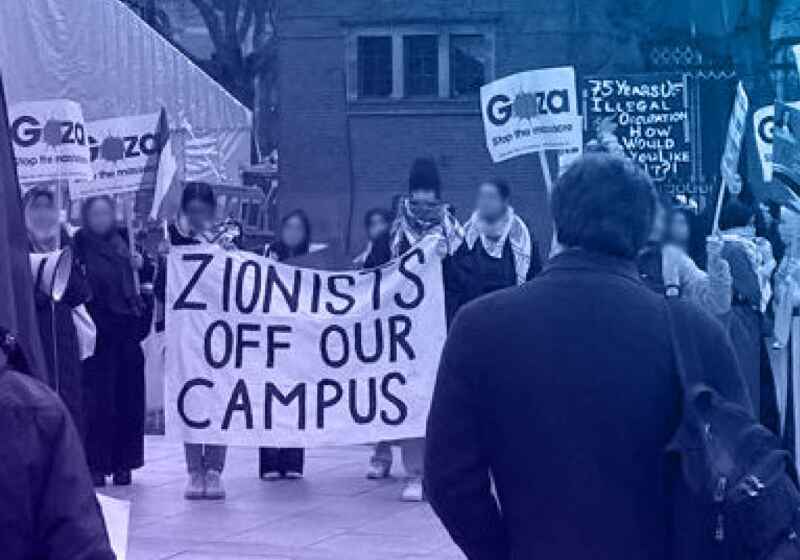CST Blog
Antisemitic Incidents Report January-June 2020
30 July 2020
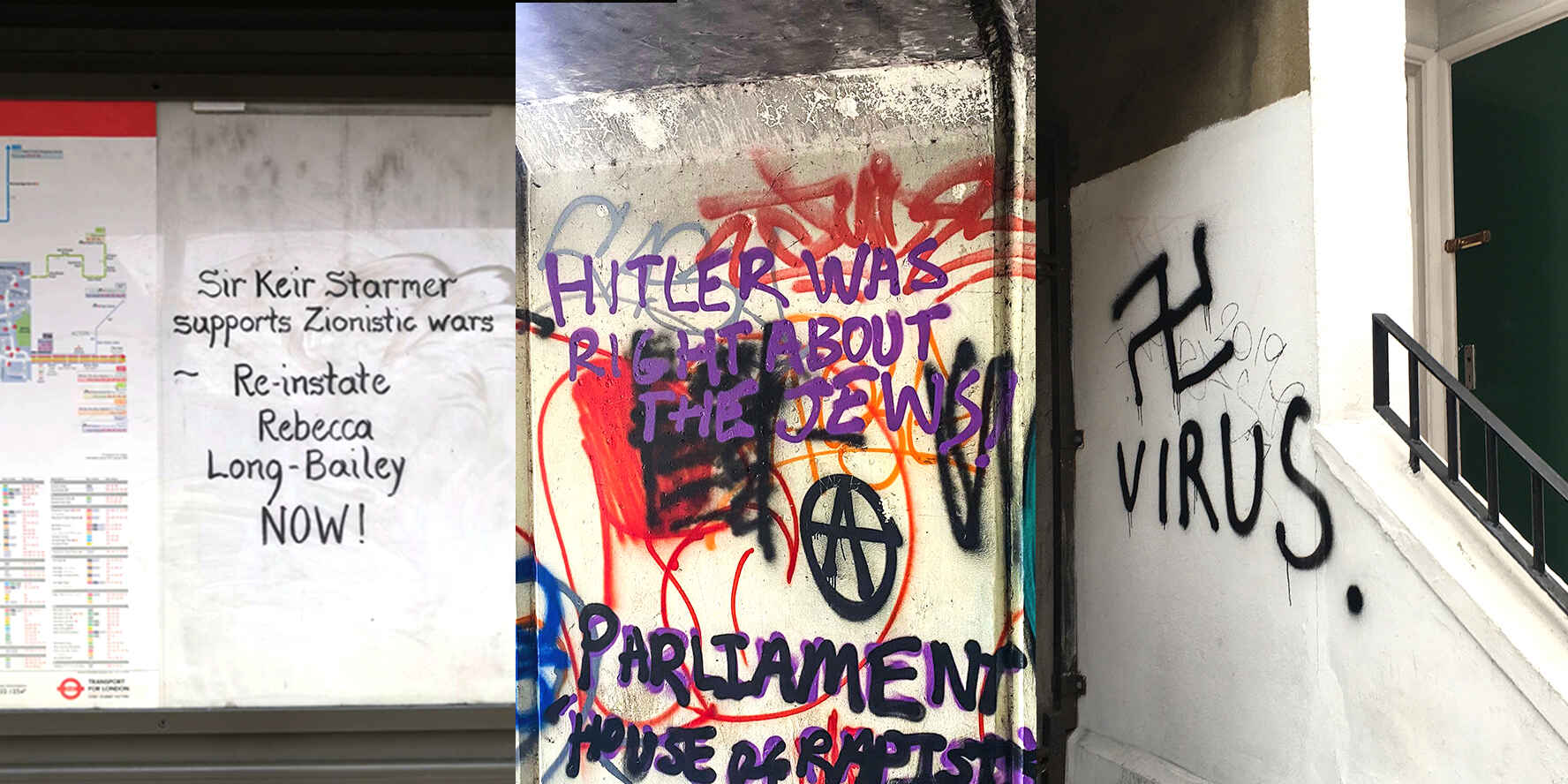
Today CST has published its Antisemitic Incidents Report for January-June 2020, which shows that 789 antisemitic incidents were recorded by CST across the UK in the first six months of this year. This is a 13 per cent fall from the 911 incidents recorded in the first half of 2019, but is still the third-highest number of incidents CST has ever recorded in the January to June period of any year. CST recorded 810 antisemitic incidents in the first half of 2018, 786 from January to June 2017, and 608 in the first six months of 2016. Download and read a copy of CST’s Antisemitic Incidents Report.
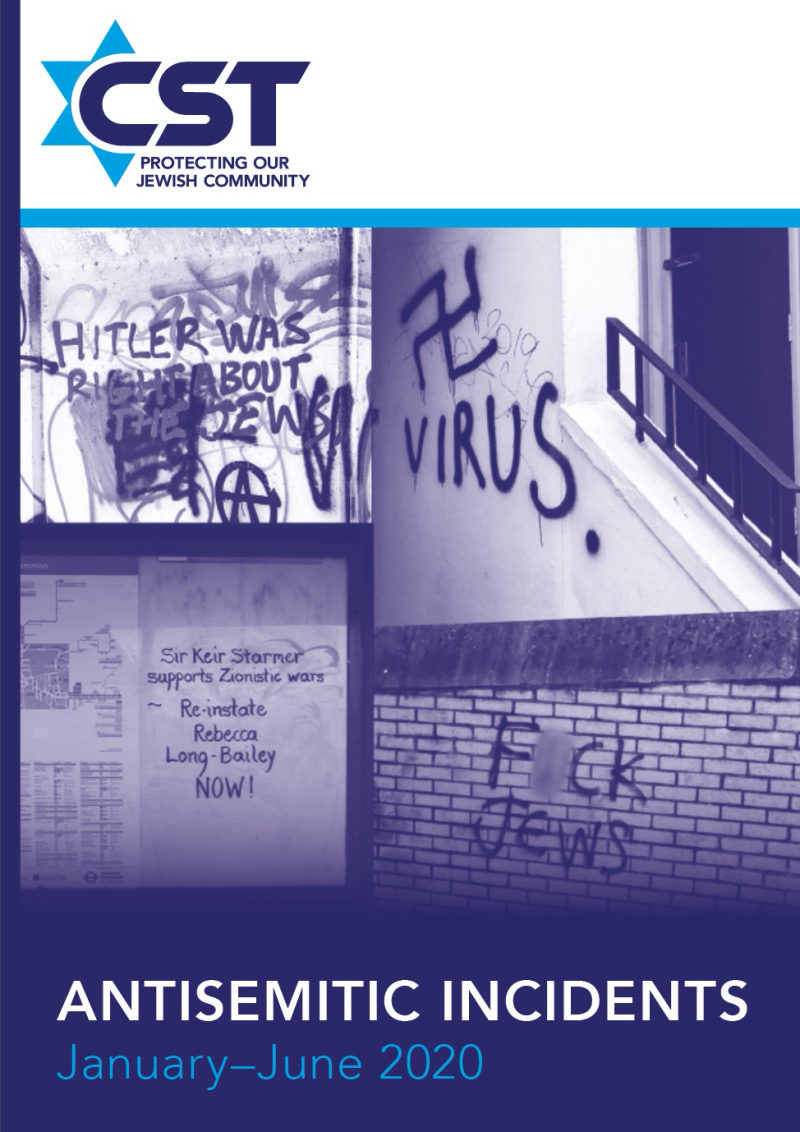
The lowest monthly totals in the first half of 2020 were April and March, with 98 and 102 antisemitic incidents respectively. April 2020 was the first month since December 2017 in which CST recorded fewer than 100 antisemitic incidents. These months correlate with the period when coronavirus lockdown measures were most forcefully communicated and enforced: the instruction to close down religious premises, schools, restaurants, pubs and other venues was issued towards the end of March, while messaging was relaxed in May. April was also the month in which the UK reached what is for now a peak number of confirmed COVID-19 cases and deaths. It is likely that all of these factors - and the way the public reacted to them – contributed to the reduction in reports of antisemitic incidents in March and April. Nevertheless, the fact that over 100 incidents were recorded in five of the six months covered by this report – even in a half-year that saw a drop in reported antisemitism – sustains the pattern of historically high antisemitic incident figures. By way of comparison, CST only recorded monthly totals surpassing 100 incidents on six occasions between January 2006 and December 2015.
The pandemic also influenced the way antisemitism manifested during this period. In the first half of 2020, CST received ten reports of educational or religious online events being hijacked with antisemitic content or behaviour. CST also recorded 26 incidents that contained antisemitic rhetoric alongside references to the pandemic, such as conspiracy theories accusing Jews of inventing the Coronavirus ‘hoax’, or of creating and spreading COVID-19 itself, for various malevolent and financial purposes; or simply wishing that Jewish people catch the virus and die.
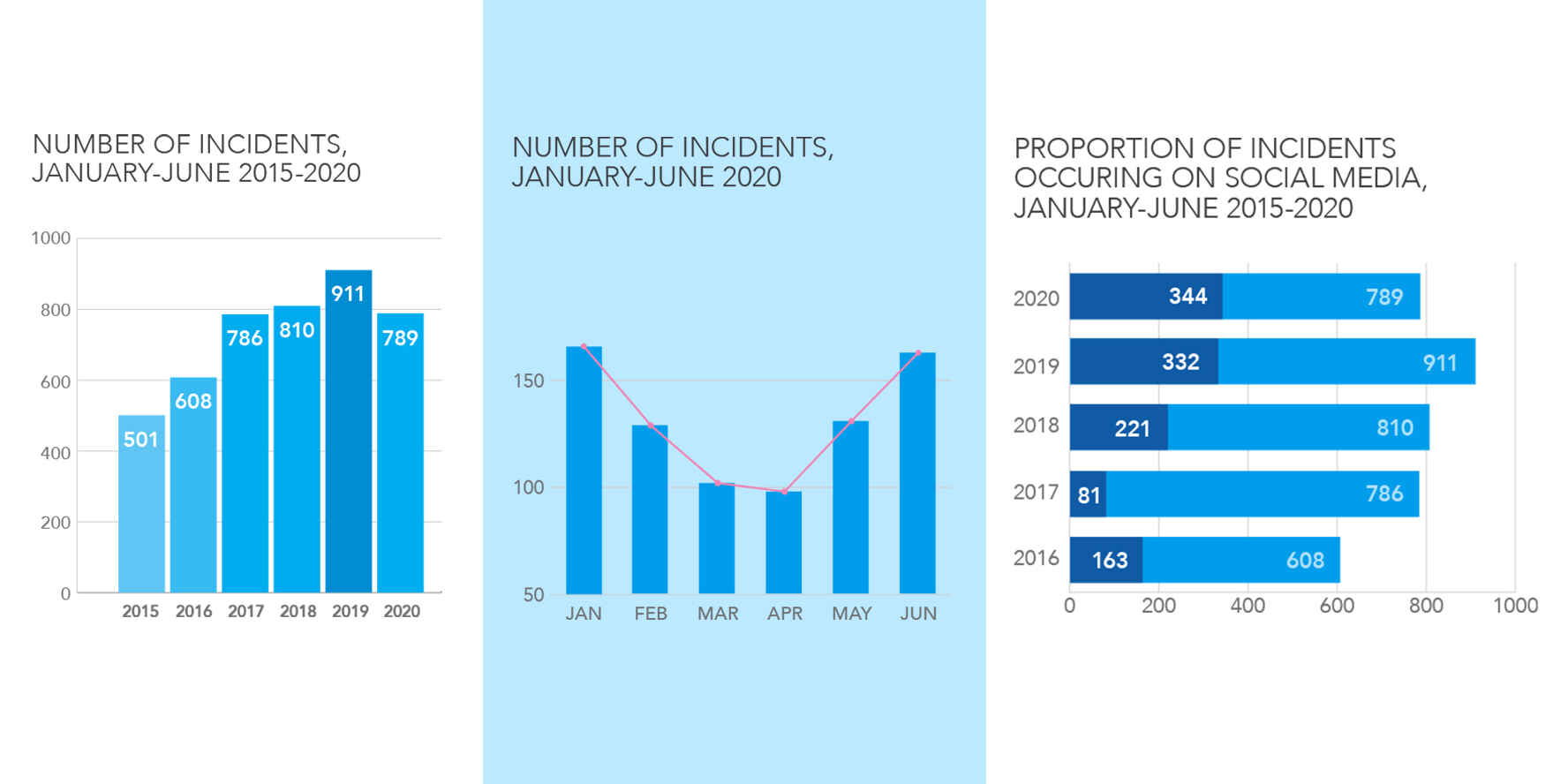
CST recorded a 45 per cent decrease in the number of violent antisemitic assaults, from 85 in the first six months of 2019 to 47 in the first half of 2020. One of these violent incidents was classified by CST as ‘Extreme Violence’, meaning it involved potential grievous bodily harm (GBH) or a threat to life. CST is not able to share any details of this incident for legal reasons. There were 28 incidents of Damage & Desecration of Jewish property in the first six months of 2020; 673 incidents of Abusive Behaviour, including verbal abuse, antisemitic graffiti, antisemitic abuse via social media and one-off cases of hate mail; 36 direct antisemitic threats; and five cases of mass-mailed antisemitic leaflets or emails. All these totals are lower than the incident totals in the same categories in the first half of 2019.
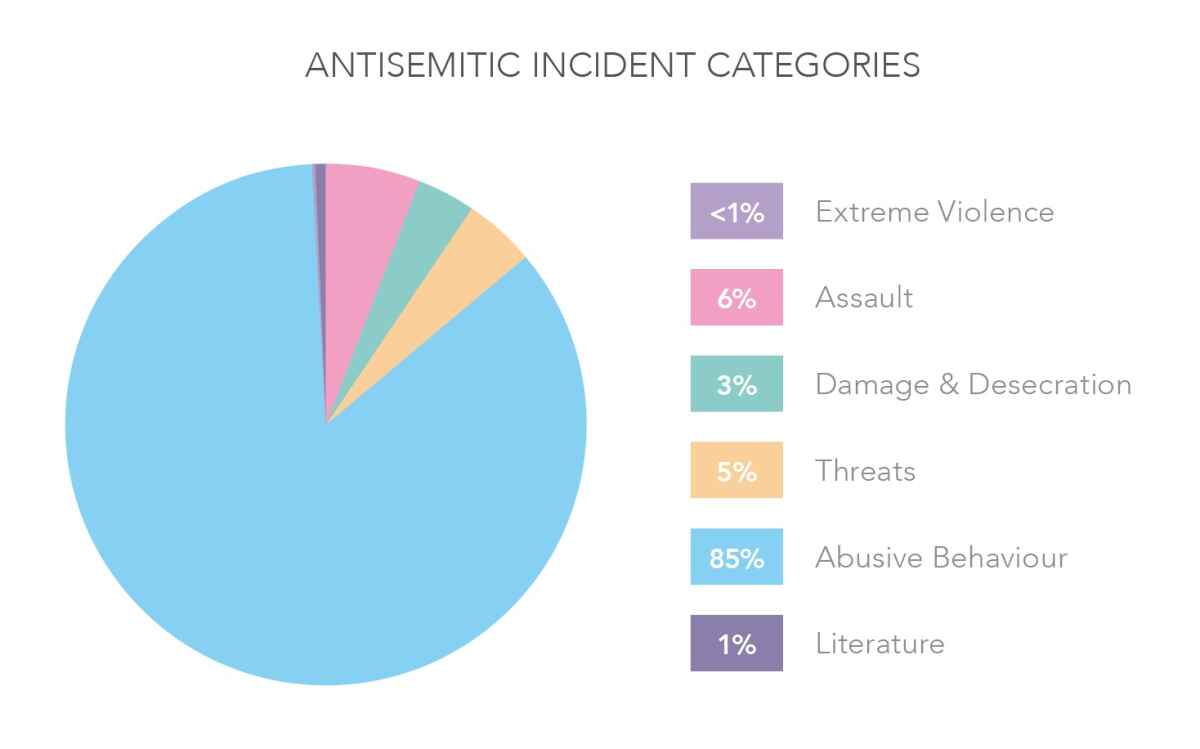
Even though the overall incident total for January to June 2020 is less than over the same period in 2019, the number of reported online antisemitic incidents increased by four per cent from 332 to 344 incidents. This is the highest number of online incidents ever recorded by CST in the first half of a year and constitutes 44 per cent of all incidents recorded in the first half of 2020, compared to 36 per cent of 2019’s six-monthly figure. The proportional increase of online incidents is mostly due to a reduction in offline incidents during lockdown. These totals understate the scale of the problem of online antisemitism: CST only records antisemitic incidents in these statistics if they have been reported by either the victim or a witness; if the content shows evidence of antisemitic language, motivation or targeting; and if the offender is based in the United Kingdom or has directly targeted a UK-based victim. Targeted campaigns directed at individual victims often involve dozens of social media accounts sending hundreds or even thousands of tweets, images or posts within a concentrated timespan, but each campaign of this type will only be recorded by CST as a single incident.

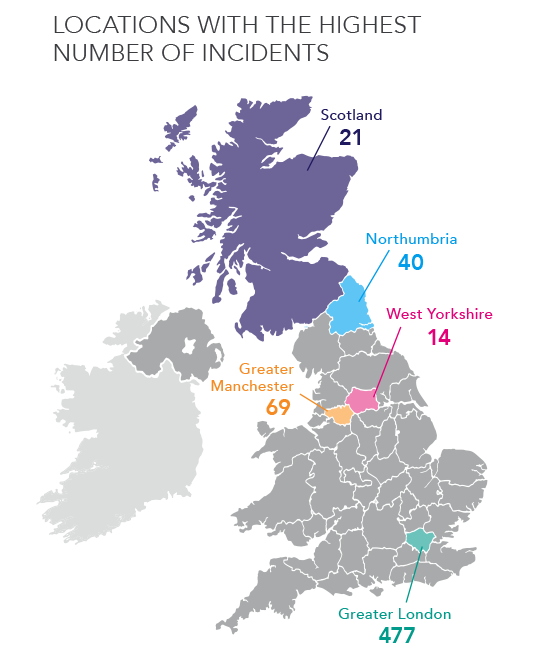
Sixty-nine per cent of the 789 antisemitic incidents were recorded in Greater London and Greater Manchester, the two largest Jewish communities in the UK. CST recorded 477 antisemitic incidents in Greater London in the first half of 2020, a rise of two per cent from the 467 incidents recorded in London in the first half of 2019; and a fall of 44 per cent in antisemitic incidents in Greater Manchester, from 123 in the first half of 2019 to 69 this year. Antisemitic incidents in Manchester tend to be more street-based than in London, where online incidents often target national Jewish leadership bodies and public figures. Consequently the drop in offline incidents in the first half of 2020, and the rise in online incidents, are likely to be reflected in the different trends in Manchester and London during this period.
Elsewhere in the UK, CST recorded an antisemitic incident in all but two Police regions across the UK (Surrey and West Mercia) in the first half of 2020, compared to nine in the first half of 2019. The Police regions with the highest numbers of recorded antisemitic incidents recorded by CST were Northumbria (from 24 to 40 incidents), West Yorkshire with 14 (compared to 23 in the first half of 2019), Lancashire with 13 (increasing from seven between January and June 2019), Hertfordshire with 12 (down from 43 in the first six months of 2019), and Sussex with 10 (compared to 9 over the same period last year). Several of these incidents were reported to CST by Police via a national data-sharing agreement.
A further 97 reports of potential incidents were received by CST in the first six months of 2020, but were not deemed to be antisemitic and are not included in this total of 789 antisemitic incidents. Many of these 97 potential incidents involved suspicious activity or possible hostile reconnaissance at Jewish locations; criminal activity affecting Jewish people and buildings; and anti-Israel activity that did not include antisemitic language, motivation or targeting.
Home Secretary Priti Patel said:
“Antisemitic hatred and abuse are completely abhorrent. In April, the Home Office announced funding of up to £14 million through the Jewish Protective Security Grant to help keep members of the Jewish community safe as they go about their daily lives. I will always stand with the Jewish community against the threat of antisemitism.”
Shadow Home Secretary Nick Thomas-Symonds said:
“These figures show that the scourge of antisemitism continues in our society. Keir Starmer has committed to tearing out the poison of antisemitism by its roots from the Labour Party, and I stand should to shoulder with him in that aim. We must do all we can to eradicate it wherever it manifests itself. The UK has a proud history of being a country of respect for other people and we must continue to uphold that important value.”
HM Government’s Independent Adviser on Antisemitism, Lord Mann, said:
"Although there has been a 13% drop on last year's figures, the rise in antisemitism in some regions shows how it affects every Jewish community in our country. Despite a good policing response, internet companies are failing to play their role in tackling this hatred and we need to see a robust consistency from all our political parties."
National Policing Lead for Hate Crime, Deputy Chief Constable Mark Hamilton said:
"We have seen elevated levels of hate crime in the United Kingdom for some considerable time. We expect to see rises in the wake of terrorist and other critical incidents as well as at times of global conflict. The COVID-19 outbreak has understandably created much fear in our society and racists have used this to promote their divisive ideologies. As ever, this includes antisemitic conspiracy theories that are unfounded, but are nonetheless widespread on the Internet. The greater the challenges we face, the more important our partnerships become and none are more important to us than the contribution of the Community Security Trust. Not only in their support of victims and the contribution to improving hate crime reporting levels, but also the invaluable analysis and research that help us to assess the threats faced by our communities. The work of our partners enables us to make better deployment decisions and to support communities. I look forward to continuing this partnership in the future, as we seek to reduce the harm that these divided times present.”
CST Chief Executive David Delew said:
“Any reduction in antisemitism is welcome, but it is worrying that even during a national lockdown antisemitic incidents only fell by 13 per cent and new antisemitic lies have emerged to add to old hatreds. History tells us that antisemitism grows at times of great social upheaval and we need to ensure the same is not happening here.”


